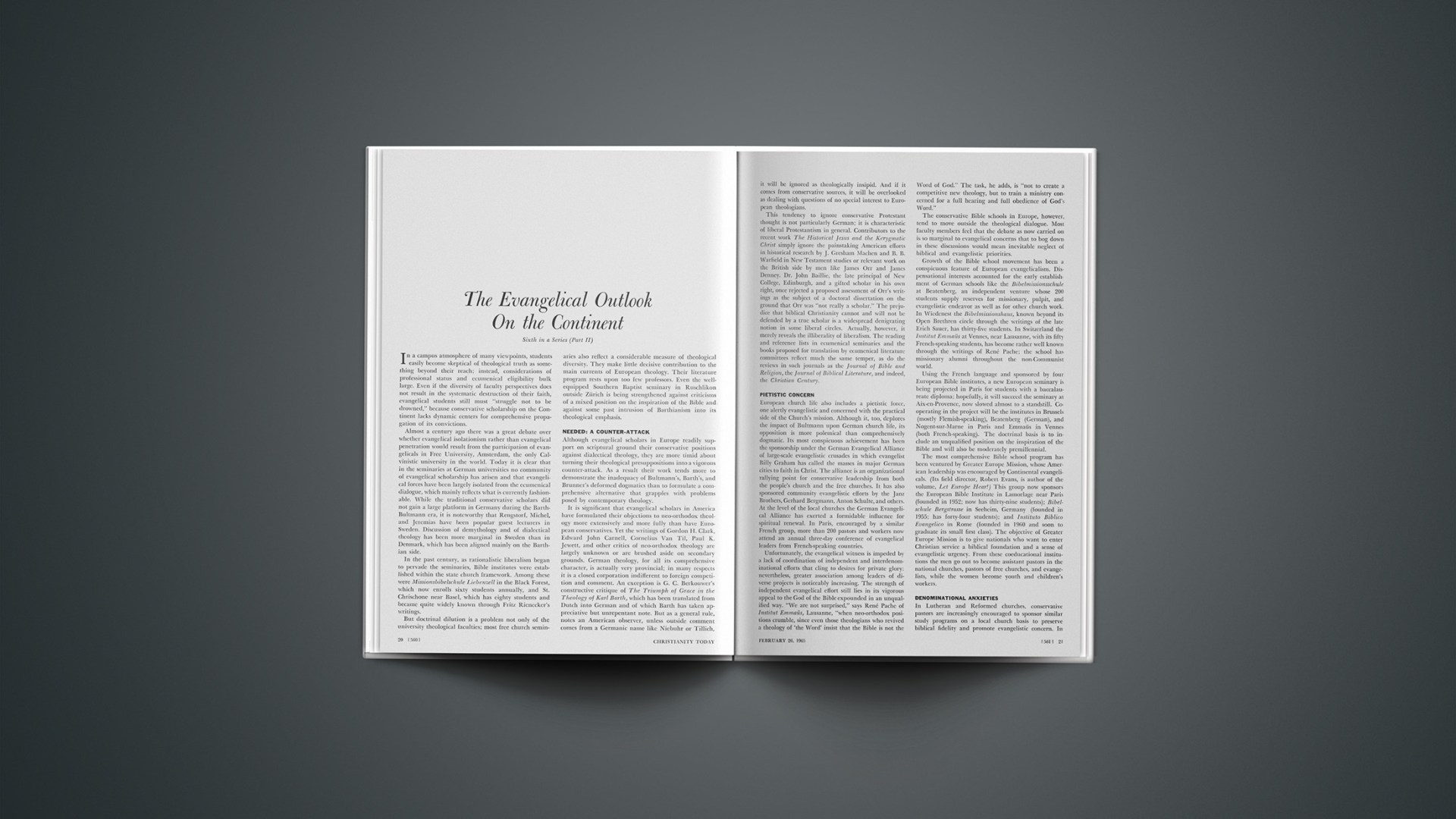Sixth in a Series (Part II)
In a campus atmosphere of many viewpoints, students easily become skeptical of theological truth as something beyond their reach; instead, considerations of professional status and ecumenical eligibility bulk large. Even if the diversity of faculty perspectives does not result in the systematic destruction of their faith, evangelical students still must “struggle not to be drowned,” because conservative scholarship on the Continent lacks dynamic centers for comprehensive propagation of its convictions.
Almost a century ago there was a great debate over whether evangelical isolationism rather than evangelical penetration would result from the participation of evangelicals in Free University, Amsterdam, the only Calvinistic university in the world. Today it is clear that in the seminaries at German universities no community of evangelical scholarship has arisen and that evangelical forces have been largely isolated from the ecumenical dialogue, which mainly reflects what is currently fashionable. While the traditional conservative scholars did not gain a large platform in Germany during the Barth-Bultmann era, it is noteworthy that Rengstorf, Michel, and Jeremias have been popular guest lecturers in Sweden. Discussion of demythology and of dialectical theology has been more marginal in Sweden than in Denmark, which has been aligned mainly on the Barthian side.
In the past century, as rationalistic liberalism began to pervade the seminaries, Bible institutes were established within the state church framework. Among these were Missionsbibelschule Liebenzell in the Black Forest, which now enrolls sixty students annually, and St. Chrischone near Basel, which has eighty students and became quite widely known through Fritz Rienecker’s writings.
But doctrinal dilution is a problem not only of the university theological faculties; most free church seminaries also reflect a considerable measure of theological diversity. They make little decisive contribution to the main currents of European theology. Their literature program rests upon too few professors. Even the well-equipped Southern Baptist seminary in Ruschlikon outside Zürich is being strengthened against criticisms of a mixed position on the inspiration of the Bible and against some past intrusion of Barthianism into its theological emphasis.
Needed: A Counter-Attack
Although evangelical scholars in Europe readily support on scriptural ground their conservative positions against dialectical theology, they are more timid about turning their theological presuppositions into a vigorous counter-attack. As a result their work tends more to demonstrate the inadequacy of Bultmann’s, Barth’s, and Brunner’s deformed dogmatics than to formulate a comprehensive alternative that grapples with problems posed by contemporary theology.
It is significant that evangelical scholars in America have formulated their objections to neo-orthodox theology more extensively and more fully than have European conservatives. Yet the writings of Gordon H. Clark, Edward John Carnell, Cornelius Van Til, Paul K. Jewett, and other critics of neo-orthodox theology are largely unknown or are brushed aside on secondary grounds. German theology, for all its comprehensive character, is actually very provincial; in many respects it is a closed corporation indifferent to foreign competition and comment. An exception is G. C. Berkouwer’s constructive critique of The Triumph of Grace in the Theology of Karl Barth, which has been translated from Dutch into German and of which Barth has taken appreciative but unrepentant note. But as a general rule, notes an American observer, unless outside comment comes from a Germanic name like Niebuhr or Tillich, it will be ignored as theologically insipid. And if it comes from conservative sources, it will be overlooked as dealing with questions of no special interest to European theologians.
This tendency to ignore conservative Protestant thought is not particularly German; it is characteristic of liberal Protestantism in general. Contributors to the recent work The Historical Jesus and the Kerygmatic Christ simply ignore the painstaking American efforts in historical research by J. Gresham Machen and B. B. Warfield in New Testament studies or relevant work on the British side by men like James Orr and James Denney. Dr. John Baillie, the late principal of New College, Edinburgh, and a gifted scholar in his own right, once rejected a proposed assessment of Orr’s writings as the subject of a doctoral dissertation on the ground that Orr was “not really a scholar.” The prejudice that biblical Christianity cannot and will not be defended by a true scholar is a widespread denigrating notion in some liberal circles. Actually, however, it merely reveals the illiberality of liberalism. The reading and reference lists in ecumenical seminaries and the books proposed for translation by ecumenical literature committees reflect much the same temper, as do the reviews in such journals as the Journal of Bible and Religion, the Journal of Biblical Literature, and indeed, the Christian Century.
Pietistic Concern
European church life also includes a pietistic force, one alertly evangelistic and concerned with the practical side of the Church’s mission. Although it, too, deplores the impact of Bultmann upon German church life, its opposition is more polemical than comprehensively dogmatic. Its most conspicuous achievement has been the sponsorship under the German Evangelical Alliance of large-scale evangelistic crusades in which evangelist Billy Graham has called the masses in major German cities to faith in Christ. The alliance is an organizational rallying point for conservative leadership from both the people’s church and the free churches. It has also sponsored community evangelistic efforts by the Janz Brothers, Gerhard Bergmann, Anton Schulte, and others. At the level of the local churches the German Evangelical Alliance has exerted a formidable influence for spiritual renewal. In Paris, encouraged by a similar French group, more than 200 pastors and workers now attend an annual three-day conference of evangelical leaders from French-speaking countries.
Unfortunately, the evangelical witness is impeded by a lack of coordination of independent and interdenominational efforts that cling to desires for private glory: nevertheless, greater association among leaders of diverse projects is noticeably increasing. The strength of independent evangelical effort still lies in its vigorous appeal to the God of the Bible expounded in an unqualified way. “We are not surprised,” says René Pache of Institut Emmaüs, Lausanne, “when neo-orthodox positions crumble, since even those theologians who revived a theology of ‘the Word’ insist that the Bible is not the Word of God.” The task, he adds, is “not to create a competitive new theology, but to train a ministry concerned for a full hearing and full obedience of God’s Word.”
The conservative Bible schools in Europe, however, tend to move outside the theological dialogue. Most faculty members feel that the debate as now carried on is so marginal to evangelical concerns that to bog down in these discussions would mean inevitable neglect of biblical and evangelistic priorities.
Growth of the Bible school movement has been a conspicuous feature of European evangelicalism. Dispensational interests accounted for the early establishment of German schools like the Bibelmissionsschule at Beatenberg, an independent venture whose 200 students supply reserves for missionary, pulpit, and evangelistic endeavor as well as for other church work. In Wiedenest the Bibelmissionshaus, known beyond its Open Brethren circle through the writings of the late Erich Sauer, has thirty-five students. In Switzerland the Institut Emmaüs at Vennes, near Lausanne, with its fifty French-speaking students, has become rather well known through the writings of René Pache; the school has missionary alumni throughout the non-Communist world.
Using the French language and sponsored by four European Bible institutes, a new European seminary is being projected in Paris for students with a baccalaureate diploma; hopefully, it will succeed the seminary at Aix-en-Provence, now slowed almost to a standstill. Cooperating in the project will be the institutes in Brussels (mostly Flemish-speaking), Beatenberg (German), and Nogent-sur-Marne in Paris and Emmaüs in Vennes (both French-speaking). The doctrinal basis is to include an unqualified position on the inspiration of the Bible and will also be moderately premillennial.
The most comprehensive Bible school program has been ventured by Greater Europe Mission, whose American leadership was encouraged by Continental evangelicals. (Its field director, Robert Evans, is author of the volume, Let Europe Hear!) This group now sponsors the European Bible Institute in Lamorlage near Paris (founded in 1952; now has thirty-nine students); Bibelschule Bergstrasse in Seeheim, Germany (founded in 1955; has forty-four students); and Instituto Biblico Evangelico in Rome (founded in 1960 and soon to graduate its small first class). The objective of Greater Europe Mission is to give nationals who want to enter Christian service a biblical foundation and a sense of evangelistic urgency. From these coeducational institutions the men go out to become assistant pastors in the national churches, pastors of free churches, and evangelists, while the women become youth and children’s workers.
Denominational Anxieties
In Lutheran and Reformed churches, conservative pastors are increasingly encouraged to sponsor similar study programs on a local church basis to preserve biblical fidelity and promote evangelistic concern. In the people’s church, for example, the evangelistic youth work of Wilhelm Busch of Essen, now retired, quickened evangelical sensitivity. Others known for evangelistic initiative and preaching are Hamburg pastor F. Heitmuller, active in the German Evangelical Alliance; Hans Brandenburg (Lutheran) of Korntal, J. Grünzweig (Moravian Brethren) of Stuttgart, and Heinrich Kemner of Ahlden; Peter Schneider, general secretary of the YMCA, West Berlin; Arno Page of Köln, leader of the Christian Endeavor effort; and Anton Schulte, a free church evangelist who has held community campaigns in Austria and Germany.
Yet no absolute contrast can be drawn between the free churches and the people’s (state) church. While the free churches are generally lively and aggressive, individual pastors in the older established denominations have equally vigorous groups. Older pastors in the established churches who reflect the influence of Schlatter, Kähler, or Barth tend to be conservative; the younger generation of ministers has been more largely influenced by Bultmann, an influence increasingly compounded with other emphases as well. The free and people’s churches often share similar tendencies. To gain respect or status, many free churches have imitated the state churches organizationally, have become enmeshed in similar theological compromises, have forsaken the proclamation of the Evangel, and have lost their fervor. Yet the people’s church goes further amiss by compounding these unfortunate tendencies with public involvement in decisionless Christianity. Because its members are automatically baptized, confirmed, married, and buried by the church, most of them assume that they belong to the body of Christ irrespective of personal faith. “The churches are state-tax-supported; what other support do they need? And what more do we need than infant baptism and confirmation?” So runs opinion. This lack of spiritual decision in the people’s church created a vacuum into which the Bultmannians could readily insert their existential appeal.
In the interest of personal faith both Barth and Brunner have attacked infant baptism; those enrolled in the churches by baptism, they imply, are not on this ground Christians. The baptismal rite has become an increasing problem for Lutheran and Reformed pastors alike. In some places ministers are no longer required to officiate at infant baptism if they have questions of conscience. Some of them encourage the children to wait. Barth has declared for believer’s baptism. For some Lutheran theologians this assertion was sufficiently provocative to end any and all interest in his theology. Brunner has hesitated to go this far; the religious structure of Continental civilization is such, he feels, that it cannot stand a renunciation of the validity of infant baptism and confirmation.










